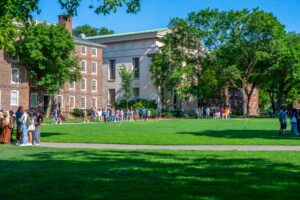All students want to do well in high school, so they can get into a great college. Part of this is taking the most challenging courses available to them. International Baccalaureate (IB) programs are not as common as AP classes, but many schools offer them, and students often wonder if these courses are right for them.
What are IB courses? How do they work? Which should you take? Can you get college credit from them, like AP courses? We will explore the answers to all these questions, and advise you on what colleges are looking for. Let’s get started!
What is an International Baccalaureate Program?
Founded in Geneva, Switzerland, in 1968, IB was intended to provide academic coursework that would prepare students for university, and for careers in diplomacy or government. The organization is still headquartered in Geneva, and all IB schools must be officially licensed before they are allowed to offer IB courses. This results in a high standard of quality for IB coursework.
While the most popular and well-known IB program is for high school students, they have programs for younger students as well. We will focus on the high school program in this article. The official name for this is the International Baccalaureate Diploma Program (IBDP).
This program is open to students aged 16-19, so most students will only take IB courses in their junior and senior years. Unlike the pick-and-choose method of taking AP courses, IB programs are more firmly set, with fewer choices for which classes you will take, and fewer course options overall.
There are six subject groups in which courses are offered. These are:
- Studies in languages and literature
- Language acquisition
- Individuals and societies
- Sciences
- Mathematics
- The arts
Courses may be taken at the standard level (SL) or higher level( HL). Higher-level courses require showing a greater depth of understanding, and cover a wider breadth of knowledge, but are graded and scored the same. All students will take three or four HL classes, with the rest being SL. We recommend you take HL courses in your strongest subjects or those which you wish to major in in college.
These subjects are meant overall to instruct students in core competencies. These competencies are:
- Theory of knowledge
- Extended essay
- Creativity, activity, and service
The extended essay is a self-directed piece of research students are expected to complete. This culminates in a 4,000-word paper. Similarly, students are expected to complete an independent project to represent the creativity, activity, and service competency. Students show an understanding of the theory of knowledge through their coursework, rather than with a specific project.
The exact courses offered through an IB program are determined by your school; each is encouraged to tailor the program to meet the needs of their students and will have slightly different course offerings. Speak with your counselor about which courses are offered, and which will best serve your needs.

IB Examinations
As with AP courses, students complete a series of exams at the end of the IBDP to demonstrate their mastery of the concepts taught. Your work in class observed and scored by your teachers is also counted for some subjects, such as lab work done for the sciences, or speaking for languages.
You receive a grade of 1 to 7 for each subject, with 7 being the best. You need a combined score of better than 24 to graduate from an IB program, with the average student attaining a 29. The theory of knowledge and extended essay is scored separately and can add up to three points to your overall score for graduation. The creativity, activity, and service section is not scored but must be completed to graduate.
The written assessments you complete are scored by the IB organization itself, to ensure that the grades are objective. Since these are for the most part done at the end of high school, you may not be able to report your scores to colleges when you are applying. This does not make IB coursework any less valuable for applying; high grades in these courses are seen as a predictor for the scores you will attain.
Covid Impacts
Due to the pandemic, exams have not been offered everywhere. This year, IB is using a dual assessment model. This means that exams are offered where it is safe to take them, and where it isn’t coursework, and projected scores are used to award final scores. This has received some criticism for perceived unfairness. It remains to be seen how the situation will evolve in the future.
College Credit for IB Courses
As with AP classes, many colleges will grant course credit to students who score well on their IB examinations. How high you need to score, and which subjects you can earn credit in, vary greatly between colleges. Generally, however, you will get course credit for scores of 6 or higher on IB exams.
The more prestigious a school is, the higher they want your scores to be to award credit. Top 20 schools, for example, will generally only give credit for scores above 6, while some schools will grant credit for scores of 5. This can vary within a school, with some subjects accepting a 5, and others requiring a 6.
IB credit can also be used to fulfill language requirements, though some schools have additional testing requirements to prove competency. As with AP classes, IB classes are sometimes used to determine placement or to satisfy prerequisites, especially in math and the sciences. You should check the policies of each college you apply to, as there isn’t any standardized way that schools handle IB coursework, though they all like to see it.
Should I take IB courses?
This depends on your own unique situation, but generally, yes, if they are offered and you are academically prepared. Colleges want students who have challenged themselves academically, especially top schools, and taking the hardest courses available is a good way to demonstrate this.
If, however, you are not confident in your academic abilities, consider giving IB a pass. Unlike AP courses, you can’t easily pick and choose which to take. IB is a system and requires taking all of the courses within it. This can be overwhelming for some students and may hurt your chances if you are unprepared academically.
The chance to gain college credit is one of the most appealing parts of the IB curriculum. College credits are very expensive, and entering a school with a few already can free up time for courses you would rather take, sometimes getting you out of courses or prerequisites.
Overall, we recommend IB courses, but your own situation must be taken into account when deciding what is right for you.
AP vs IB
Some schools offer both AP and IB courses. Advanced students can and should take both. Since you cannot enter IB coursework until you are 16, AP courses allow you to take advanced coursework in your sophomore or even freshman year.
Students who do not feel academically prepared for IB courses should focus on taking a few AP courses each year and doing well in them. Doing excellently in a few hard courses is better than a mediocre showing in an overall harder schedule. The best of course is to do amazingly in the hardest courses, but this is not always possible. You should take the courses that give you the best chance for success.
Final Thoughts
More than 800 high schools in the US offer an IB curriculum, though it is still far less prevalent than AP courses. If you would like advice on which AP courses or exams you should take, see our guide on the subject. While you may not have IB at your high school, we advise you to take advantage of whatever academic opportunities you can find.
If you want advice on your academic situation, and guidance on whether an IB curriculum is right for you, schedule a free consultation with us. We have a long experience helping high school students reach their full potential, and are always happy to hear from you.





